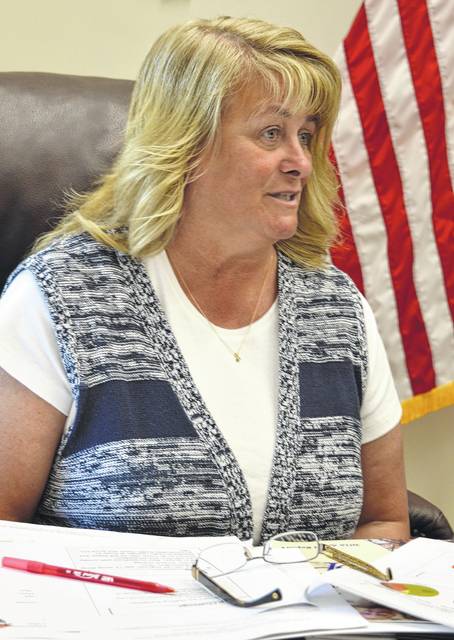
WILMINGTON — Council on Aging (COA) officials reported Monday on their efforts locally to deal with a continuing shortage of home care aides for older adults.
“Home health aide turnover has increased complaints about no-shows, inconsistent aides, and difficulty with getting services started,” COA’s Elderly Services Program Manager Kim Clark told Clinton County commissioners.
All three county commissioners, in their own turn, emphasized that solving the home care worker shortage should be a priority.
At one juncture, Clinton County Commissioners President Kerry R. Steed said, “Let’s get to a point where if we can fix it, fix it; and if it can’t [be fixed], then we need to move forward in another direction.”
Clinton County Commissioner Brenda K. Woods spoke about receiving phone calls from seniors, and Clinton County Commissioner Patrick Haley, mentioning the senior clients, said he agreed it’s an important issue and asked about backup workers when an aide is sick or does not show up.
COA’s Vice President of Program Operations Ken Wilson said sometimes there is a problem that the senior client doesn’t trust the unknown backup person, in addition to the numbers problem in workers.
In January 2017, COA requested and received a green light from the commissioners to pursue three additional options to address the workforce shortage. Clark and Wilson gave updates on those items, plus other developments on the problem.
COA, as it planned to, has contracted with the First Community Health organization. First Community began accepting referrals in March, said Clark.
This is the third group COA contracts with for home care workers. The other two are Clinton County Community Action for homemaking services (150 clients), and the company Home Care by Black Stone for homemaking, respite, and personal care services (148 clients).
COA also has implemented an option called a consumer-directed care program. With this program, the seniors become the “employers” and can choose who they want as their worker — often a family member or a neighbor.
Currently, there are two applications in process for the consumer-directed care.
The third option listed in January did not get off the ground. It involved using independent home care workers not affiliated with a company or agency. COA surveyed current independent providers in the county, and the results showed a lack of interest to take part in the Elderly Services Program which COA administers, Clark said.
Survey respondents indicated the time blocks were not big enough, and most respondents already had full schedules with their existing Medicaid contracts. Furthermore, some independent home care workers are getting out of the business, saying it doesn’t pay enough, and, as independent workers, they have to pay their own mileage and don’t have benefits.
In terms of other approaches, COA has met with the local Chamber of Commerce, Clinton Memorial Hospital, and Clinton County Job and Family Services (JFS) in the hope of recruiting more home care workers.
JFS Director Kathi Spirk attended the commissioners meeting, and reported Council on Aging spoke with JFS’ employment and training division OhioMeansJobs. JFS has some funds it can use to assist with STNA (Nurse Aide Certificate) training — a certificate that is not required for home care workers in Ohio, but completing the training shows an interest in home care type service, added Spirk.
JFS is committed to assisting as much as it can to help COA in resolving the shortage of home care workers, Spirk said.
Community Action is at capacity for homemaking services, said COA officials.
A meeting is scheduled this week between COA and Home Care by Black Stone, said Clark. The meeting is meant to explore possibilities to maximize the capacity of Black Stone’s workforce, perhaps by grouping clients geographically.
She also said Black Stone has submitted a corrective action plan to address problems COA found during its audit, “including late supervisory visits, no shows, and some unsupported billing.”
COA is considering investing in software that would enable COA to know within 15 minutes that a home care worker has not shown up for a scheduled home visit.
Clark said the home care workforce shortage is a nationwide issue, and is being discussed in Columbus because Medicaid waiver programs are having the same problem.
On another subject, COA officials recommended continuing the Fast Track Home pilot program. Under the program, eligible seniors discharged from CMH or a nursing facility receive in-home services sooner after their discharge.
To speed up access to Elderly Services Program in-home services after discharge, eligibility assessments are done in the institutional settings before patients go home.
Commissioners wanted to review the amended contract between their board and COA, as well as have their legal counsel look at it, and so did not take immediate action Monday.
Reach Gary Huffenberger at 937-556-5768.


